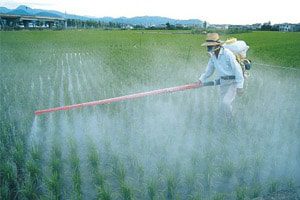
Last week the International Agency for Research on Cancer (IARC), the World Health Organization’s cancer research arm, declared that glyphosate, the active ingredient in the widely used herbicide Roundup, probably causes cancer in humans. The agency also classified the insecticides malathion and diazinon as “probable” carcinogens. Roundup, made by Monsanto for both home and commercial […]

W.H.O. Declares Monsanto Herbicide Roundup a Carcinogen
Last week the International Agency for Research on Cancer (IARC), the World Health Organization’s cancer research arm, declared that glyphosate, the active ingredient in the widely used herbicide Roundup, probably causes cancer in humans. The agency also classified the insecticides malathion and diazinon as “probable” carcinogens.
Roundup, made by Monsanto for both home and commercial use, is crucial in the production of genetically engineered corn and soybeans, The New York Times reports. The herbicide is probably toxic at high doses or with prolonged exposure, circumstances that are common among farmers and farm workers. Roundup has been used since the 1970s. In addition to being a probable carcinogen, glyphosate has been shown to cause such symptoms as respiratory distress, impaired consciousness, pulmonary edema, arrhythmias, and renal failure, according to a 2004 study published in Toxicology Review.
Times columnist Mark Bittman notes that the U.S. has a “sad history” of the general public “acting as guinea pigs for the novel chemicals that industry develops.” “We have all too often paid with our damaged health,” he writes. He points out that Europe, Canada and Australia take a precautionary approach to new biotechnology, on the assumption that it is better to prevent damage than repair it, according to the Times. But the FDA looks for proof that a chemical in fact causes cancer rather than proof that it is safe. Since there is no ethical way to test the health risks of chemicals and food additives on humans, the FDA must rely instead on animal testing, the Times reports. Bittman argues that the FDA’s job should be to guarantee a “reasonable expectation” of protection from danger and the agency should not to wait until people become sick before it removes products from the market.
More research needs to be done to determine the degree to which glyphosate, is carcinogenic. The chemical has been associated with non-Hodgkin’s lymphoma. It has been suggested that Monsanto should bear the responsibility—and expense—of testing. Monsanto produces not only Roundup but also seeds that are resistant to glyphosate, The idea is that glyphosate sprayed onto fields should kill all plants but the crop from the resistant seeds, though many weeds have now become tolerant of glyphosate, according to the Times.
The IARC report recommends that the Environmental Protection Agency examine the dangers of glyphosate. But the EPA does not have the have the resources to test the herbicide. Bittman suggests Monsanto, which profits from both agricultural chemicals and modified seeds, should be the entity to pay for testing.
An array of health and environmental experts, including the National Resources Defense Council, argue for food-growing methods that reduce the use of chemicals that can pose serious risks to both the general public and farm workers. Maintaining soil health, interplanting, and crop rotation are among the techniques that can reduce the use of chemicals, according to the Times.
Read more at: Monsanto’s Dirty Dozen: The Effects These 12 Dangerous Products Have Had On The World


